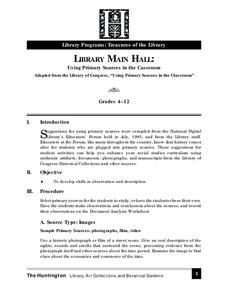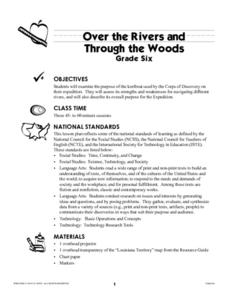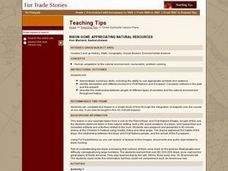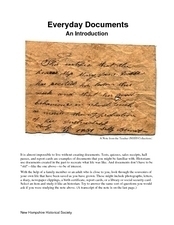Curated OER
"How to Think Like an Archaeologist" - Suggested Pre-Visit Activity For Historic Jamestown
Learners examine how archaeologists use artifacts to explore other people and their cultures. They discuss types of artifacts, analyze receipts for clues, and discuss how what the items bought reflect about people.
Curated OER
The "Me" Exhibit
Students collects artifacts from home that they feel describe themselves. They write captions for each artifact and display them for their classmates.
Curated OER
History Detective: The Case of the Mysterious Trunk
Students role play as history detectives. In this historical inquiry lesson, students discuss what detectives do, analyze a trunk of "artifacts" and make conclusions about its fictional owner. Students complete six pages of related art,...
Curated OER
Ancient Egypt
This lesson plan template aligns with the TechnoMummy curriculum and resources, but includes great ideas to use without the curriculum. During this lesson on Ancient Egypt, learners will become Egyptologists and learn about ancient...
Curated OER
What Can We Learn From the Past?
Students observe items from their past, making inferences and observations about their own culture based on these artifacts. Students then share with the class what they learned about their own culture, giving all students more...
Curated OER
A Race Against Time
Students explore the act of preservation first in the process of preserving food and then in the preservation of historic sites, buildings, landmarks, and artifacts.
Curated OER
Revive, Contemplate, Integrate
Students recognize flags as a symbol through writing and imagery. For this artifact lesson, students investigate Tibetan prayer flags and their significance. Students create personal prayer flags and write about their life experience of...
Curated OER
Using Primary Sources in the Classroom
Scholars study a historical photograph to make predictions of what happened right after the picture was taken. They research a variety of different topics and use primary sources to answer questions about common food, fashion trends, and...
Curated OER
People of the Stone Age: Hunters and Gatherers
Intended for a young audience, this presentation provides a simplistic view of the life of a Stone Age hunter/gatherer. Human migration, gathering, tools, and the Ice Age are covered but not in-depth. A topical discussion with good...
Curated OER
Name That Point!
Students compare projectile point attributes, identify and classify points, and match projectile points to a chronology.
Curated OER
What Can We Learn From Bones?
Pupils discuss what type of information they can gather from bones. In groups, they travel between stations in which they can view photos and listen to actual accounts of finding bones. They focus on the tools available to Native...
Curated OER
Japanese Objects as Cultural Artifacts: A Model Lesson Using Textiles
Students complete a unit on the cultural significance of textiles in the Japanese culturre. They analyze cotton, line, silk, and wool fabrics, examine various fabric creation and decoration techniques, select an object and write a...
Curated OER
Clues to the Past
Students take a 1.3 mile walking tour of Chippokes Plantation, inspect significant historic buildings and artifacts, and make inferences about plantation life from their observations while answering a series of questions.
Curated OER
What's Missing?
Learners examine their beliefs about archaeological preservation. They articulate a response to archaeological resource destruction. Students then complete two puzzles and relate them to archaeological research.
Curated OER
Inference By Analogy
Students infer the use or meaning of items recovered from a North Carolina Native American site based on 17th-century European settlers' accounts and illustration.
Curated OER
Over the Rivers and Through the Woods
Sixth graders examine the purpose of the keelboat used by the Corps of Discovery on the Lewis and Clark expedition. They assess its strengths and weaknesses for navigating different rivers, and describe its overall purpose for the...
Curated OER
Bison Gone: Appreciating Natural Resources
Students examine the effects of the loss of the bison after the Europeans arrived in North America. They conduct a demonstration using beans to demonstrate the difference between the number of bison before and after the arrival of the...
Curated OER
What Kind of Santa Claus You Are.
Students use a photograph analysis sheet to analyze primary sources (photographs) of the Great Depression in small groups. They then write a poem about kids in the Depression Era that reflects their comprehension of the period and...
Curated OER
Populism and the People’s Party
Students examine the history of the Populist Party as it relates to its reforms and economic plight. In this Populism and the People's Party lesson plan, students explore why farmers experienced financial difficulty at the end of the...
Curated OER
Minoan and Mycenaean Comparison and Contrast
For this ancient history worksheet, students compare and contrast the Minoan and Mycenaean cultures in the given chart. They identify their art, trade, building techniques, language, religion, and the area that they were each located.
Curated OER
The Treaty Trail: U.S. Indian Treaty Councils in the Northwest
Students create a timeline with the major events of the 19th and 20th century dealing with Native Americans. They examine artifacts and discuss how they reflect culture. They also identify trade routes the Native Americans used.
Curated OER
Everyday Documents
Almost more of a lesson than a instructional activity, this particular resource has learners examine different types of historical documents. There is a historical docment embedded in the instructional activity that learners study, and...
Curated OER
Immigration History Firsthand
Students interpret historical evidence presented in primary and secondary resources. In this immigration lesson, students conduct research regarding Ellis Island and the American immigrant experience. Students use...























